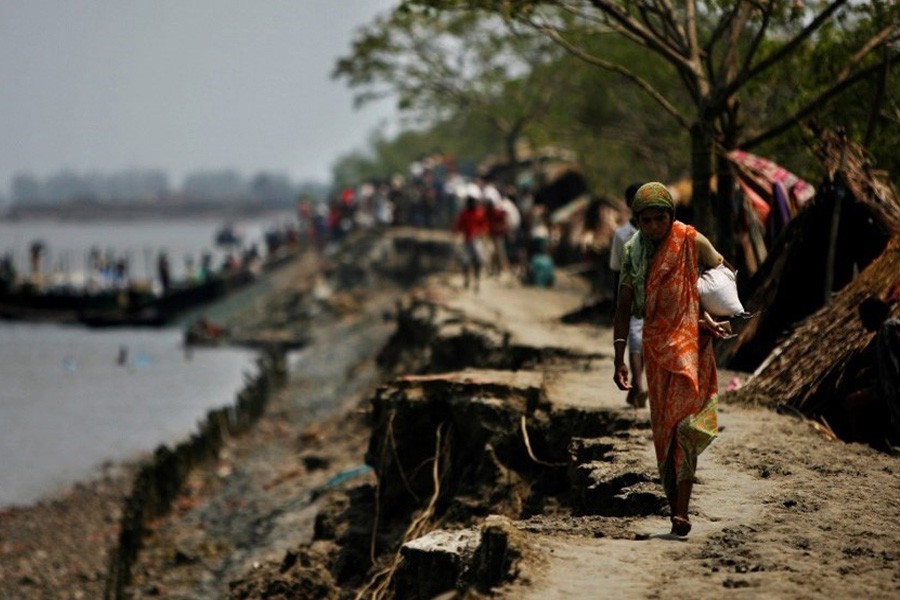Now that the monsoon appears to be reverting to its earlier form in the country, the abundant rains should be dealt with fruitfully, both in terms of infrastructure and planning, writes Shihab Sarkar
Coping with rains in Dhaka other cities
Opinion

Published :
Updated :

Compared to the dreadful views of urban Dhaka these days during the monsoon, the ones of the past might appear idyllic to many. In the not-too-distant past, the monsoon used to arrive on time. Beginning from early June through July up to mid-August, the time of the rains would keep Dhaka's landscape moist, with its vegetation wearing a lush look. Dhaka once was a famously green city.
Today's younger generations cannot think even remotely of the monsoon charm that the city used to have during the rainy season. Unlike these days, the names of the Bangla months Ashar, Shrabon and Bhadra used to remain lodged in the popular psyche back then. The extension of the Ashar-Srabon rains to the autumnal Bhadra was a common phenomenon in the country in those days. The seasonal cycle later went upside down when the rainy season started becoming arid, with the timely arrival of the monsoon becoming a rarity.
Over the last few years, the season of rains seems to have resumed its age-old pattern of arrival and departure. By that time, capital Dhaka had undergone lots of changes physically and in terms of its newly entrenched characteristics. The monsoon these days is a metonymy for seemingly endless public sufferings in the metropolis. Apparently due to mismanagement on the part of municipal and different authorities, monsoon woes have started to plague the country's other major and smaller cities as well. After Dhaka the menace of water-logging first hit Chittagong, the country's second largest city. Scenically far more attractive than the capital, more livable and with far less urban ills, Chittagong's turning into a veritable nightmare in monsoon is a sad tale. Like Dhaka, it, too, fell victim to the greed of encroachers. In a span of mere two decades, some of its major canals and large storm-water drains have been filled. Thanks to the unplanned growth of the city and the reckless occupation of its flood flow zones by land grabbers, the low-lying areas began going under water following even brief spells of shower. Vehicles plying submerged roads and pedestrians negotiating them are now a common sight during the full monsoon. To the incredulity of many, the rolling city of Chittagong was once regarded as one of the healthiest in South Asia. Apart from its dense forest covered hills, the unspoilt river and the tranquil coastline, its showers immensely added to its attraction. The urban menace of water-logging has had to wait for decades before it began afflicting Chittagong, also the country's largest seaport. Nowadays, the residents of the port city brace for one of their worst times at the advent of the monsoon. The season of rains has, thus, become synonymous with urban miseries in the city.
The northeastern Sylhet, another city topographically different from the mainland plains, has lately been struggling with the water-logging problem. Like Chittagong, stagnant water was a menace completely unheard-of in this hillock-covered town. Owing mainly to rapid and poorly planned urbanisation coupled with encroachment of varied types, stagnant rain water appears to be turning into a perennial problem for the city. This year, the overflowing of the major rivers around the city has aggravated water-logging.
The turning of Dhaka's past monsoons into the times of urban ordeals is largely a tale of insouciance on the part of the authorities concerned. The devil-may-care attitude towards grabbing public lands adopted by the unscrupulous elements and lack of awareness among the general people have made the episode bleaker. Now that the monsoon appears to be reverting to its earlier form in the country, the abundant rains should be dealt with fruitfully, both in terms of infrastructure and planning. Full monsoons are a boon to the nation.
shihabskr@ymail.com


 For all latest news, follow The Financial Express Google News channel.
For all latest news, follow The Financial Express Google News channel.